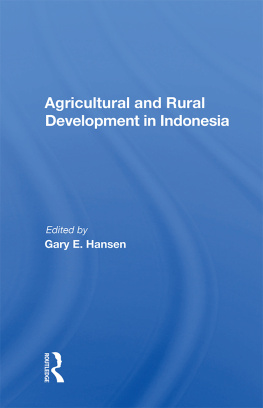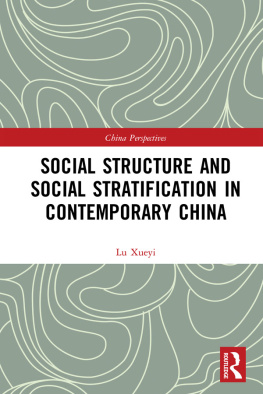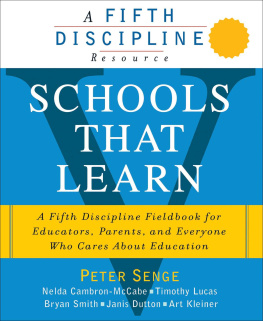Publication of this book was made possible in part by grants from the University of Oslo and the Chiang Ching-kuo Foundation for International Scholarly Exchange.
2015 by the University of Washington Press
Portions of chapters were previously published in Learning Individualism: Hesse, Confucius, and Pep-Rallies in a Chinese Rural High School in The China Quarterly 213, pp. 6077. 2013 the China Quarterly.
Printed and bound in the United States of America
Composed in Minion Pro, typeface designed by Robert Slimbach
18 17 16 15 5 4 3 2 1
All rights reserved. No part of this publication may be reproduced or transmitted in any form or by any means, electronic or mechanical, including photocopy, recording, or any information storage or retrieval system, without permission in writing from the publisher.
University of Washington Press
www.washington.edu/uwpress
Library of Congress Cataloging-in-Publication Data
Hansen, Mette Halskov.
Educating the Chinese individual : life in a rural boarding school / Mette Halskov Hansen.
pages cm
Includes bibliographical references and index.
ISBN 978-0-295-99408-6 (hardcover : alk. paper)
1. Rural youthEducationChinaHistory21st century.
2. Education, RuralChina.
3. Educational changeChinaHistory21st century.
4. Education and stateChinaHistory21st century.
I. Title.
LC5148.C6H35 2014
370.9173'40951dc23 2014007527
The paper used in this publication is acid-free and meets the minimum requirements of American National Standard for Information SciencesPermanence of Paper for Printed Library Materials, ANSI Z39.48 1984.
ISBN-13: 978-0-295-80543-6 (electronic)
ACKNOWLEDGMENTS
The research behind this book started with fieldwork at a rural boarding school in Zhejiang in 2008. During the years from 2008 to 2012 I returned several times a year to this and other schools in the area, and each time I stayed for weeks in the private home of a retired teacher, her students, and her relatives. I am profoundly grateful to my dear friends in China who introduced me to this municipality and to the school. The study would not have been possible without this personal introduction to the open-minded leadership of Number Two High, a boarding school situated in a small town whose name is kept anonymous throughout this book. The rector of the school permitted me to do anthropological fieldwork that deepens our understanding of how individualization processes that permeate Chinese society are manifested and evolving in the most important institution for socializing and educating the youth in China: the state school. Every time I returned, the school received me with open arms, and teachers, students, and school superintendents and administrators willingly included me in their daily routines. Spouses of teachers, parents of students, shop owners, fortune tellers, and other inhabitants in the town were friendly and accommodating, opening their doors to me, telling about daily life, their experiences with the education system, or exchanging views on the developments in China, Norway, and the rest of the world.
Obviously, not everyone connected to Number Two High would agree to all my conclusions in this book, and there may well be activities and practices that I interpret in way different than they would have. Nevertheless, I have tried to remain as accurate as possible in my representations of the information, impressions, and insights that I obtained during my time at the school, and I hope that any misunderstandings or misinterpretations on my part will be forgiven.
My fieldwork was made possible by generous financial support from the Faculty of Humanities and the Department of Culture Studies and Oriental Language at the University of Oslo, and by the unconditional support from Dean Trine Syvertsen and Pro-dean Gro Bjrnerud Mo, who approved my research in China even though I had responsibilities at home as a pro-dean member of our team. From 2011 to 2012, the faculty and my department granted me one year of research sabbatical that made it possible to finish the fieldwork and write this manuscript. It also provided my husband and me with the excellent opportunity to be visiting scholars in the Department of Anthropology at the Chinese University of Hong Kong (CUHK) for one year. I sincerely thank the leadership and all the staff members in this department at CUHK. They offered me a great opportunity to become part of a vibrant and stimulating anthropological environmenta scholarly community in which even those who do not explicitly work with or in China have an impressive knowledge of Chinese society and culture and are interested in including it in general anthropology. I am especially grateful to Sidney Cheung, Joe Bosco, Gordon Mathews, Tan Chee Beng, Wang Danning, Chen Ju-chen, Chee Wai-Chee, as well as Li Keping, Eddie Schmitt, and all the postgraduate students with whom I talked during our stay at CHUK. I also benefited greatly from discussions and feedback from many other scholars who were based in Hong Kong at the time, and I especially like to thank Gerry Postiglione, Wang Dan, and their colleagues and postgraduate students working on Chinese education at Hong Kong University, as well as Flora Sapio, Magnus Fiskesj, and Brge Bakken.
During my work with the manuscript and the articles preceding it, I have been fortunate to have many willing and critical readers. First of all, I thank Stig Thgersen for so carefully reading and competently commenting on every chapter in the book. I am truly grateful for his willingness to continuously engage in my work. In addition, two of the anonymous readers of the manuscript impressed me with their detailed and highly relevant suggestions for improvements.
Although obviously all mistakes or errors in this book can only be blamed on me, I am grateful to all the other people who have taken time over the years to comment on my work on individualization in the state school, including Bjrn Alpermann, Marianne Bastid, Peter Cave, Eric Florence, Gilles Guiheux, Christian Gbel, Andrew Kipnis, Richard Madsen, Rachel Murphy, Barbara Schulte, Terry Woronov, Yunxiang Yan, and Dan Smyer Yu.
In the final stages of preparing the manuscript for submission to UWP, Wilford Augustus proved to be an excellent language editor, and Rowan Parry helped with numerous practical tasks. I am sincerely grateful to all the people at the University of Washington Press, including BookMatters, who have worked on the books production, especially executive editor Lorri Hagman, who has been of invaluable support.
Finally, a special thanks to Cuiming Pang and Koen Wellens, without whom neither fieldwork nor manuscript would have been completed.






